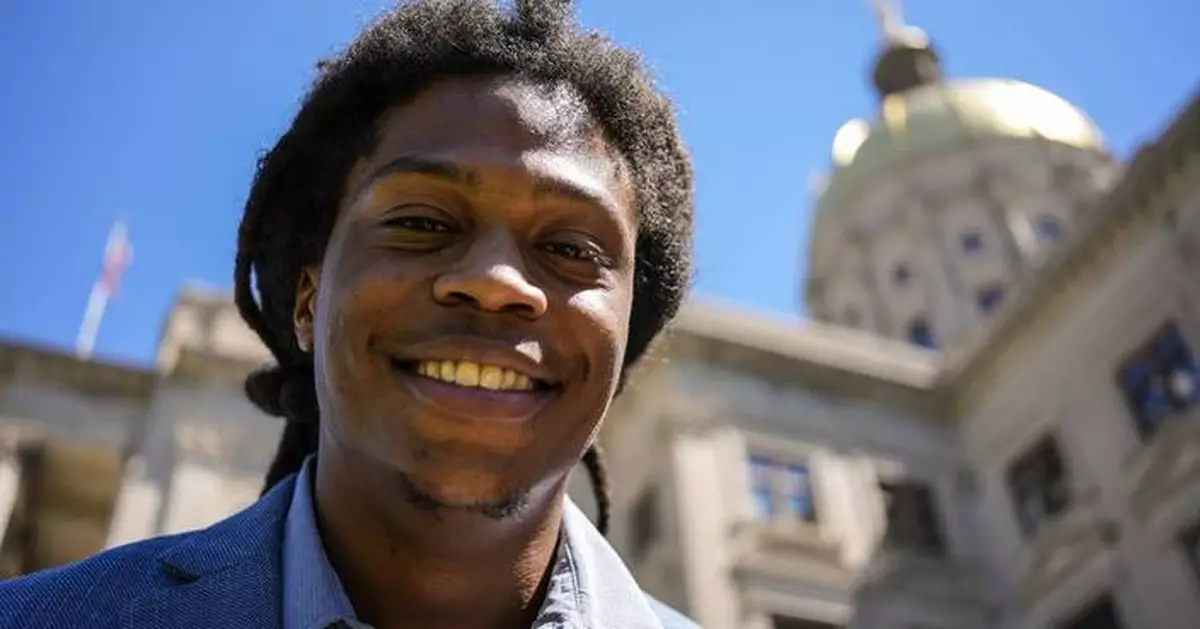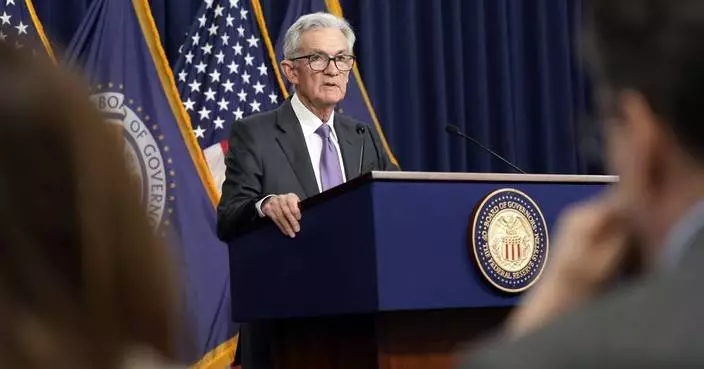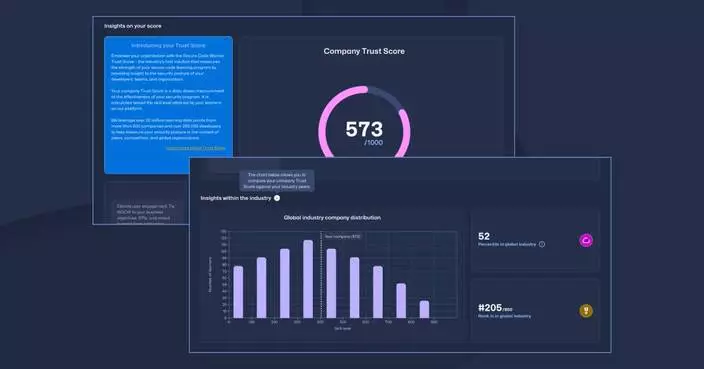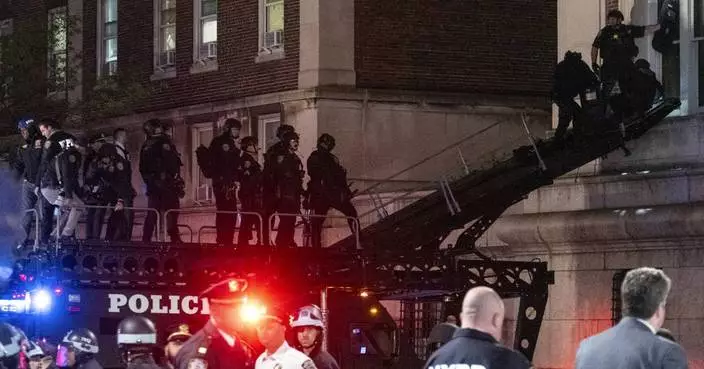ATLANTA (AP) — Davante Jennings cast his first ballot for Democrat Hillary Clinton in the 2016 presidential race. Republican Donald Trump's election that year, he says, turned him from an idealistic college student to a jaded cynic overnight.
Jennings walked away from a system he thought ignored people like himself, a young Black man who grew up politically conscious in Alabama but wielded no obvious power. It took nearly six years for him to see that view as self-defeating.
Now, at 27, Jennings is not only eager to cast his second presidential vote for Democratic President Joe Biden, but he also is fully invested as an activist, top aide to a Georgia state lawmaker and regular volunteer recruiting would-be voters off the sideline as part of the not-for-profit New Georgia Project.
“I was like, I’m not voting for this if it’s all rigged and doesn’t even matter,” he said in an interview. “Now, I can talk to people that have been beaten down by the system and say, ‘I get it. Let’s talk about why this is important.’”
Jennings’ path spotlights the tens of millions of Americans whom political campaigns often refer to as “low-propensity voters,” people who never vote or only occasionally do so in a general election. About 1 in 3 eligible Americans did not vote in 2020. In 2016, it was was more like 4 out of 10.
With presidential elections often decided on close margins in a few states, those voters could determine whether Biden is reelected or Trump completes his White House comeback. Biden’s campaign has had a notable head start in trying to reach such voters, but both campaigns, along with political action groups across the spectrum, aim to build a wide organizing footprint to maximize support in the fall.
“It is so critical to have an actual campaign where people can feel like they see part of themselves,” Roohi Rustum, Biden’s national organizing director, said in an interview.
Biden and Trump each owes his election to those sporadic, disaffected voters who often feel unrepresented.
Democrats’ inconsistent supporters trend younger and are much more likely to be nonwhite. They helped Biden win Pennsylvania, Michigan and Wisconsin in 2020, four years after Trump had flipped them in his defeat of Clinton, while adding Georgia and Arizona to his column.
To recreate that coalition, Rustum's efforts already include more than 100 field offices, 300-plus paid staffers and, through the end of March, about 385,000 recruiting calls to volunteers. The campaign is highlighting Biden’s policy record and believes Biden wins a comparison with Trump as the more empathetic, stable figure. But the campaign also is prioritizing a network of volunteers to make the case within their own circles, especially in areas with lagging turnout.
“No talking point is going to be as persuasive as someone they know in their community,” Rustum said, adding that “it’s actually your pastor, your cousin, your neighbor.”
Jennings does not work directly for Biden’s campaign. But his role with the New Georgia Project, which was started a decade ago by Democratic power player Stacey Abrams to increase Black turnout in Georgia, reflects a similar philosophy.
Voter concerns, he argued, often cross party and demographic lines more than the national conversation reflects. “There’s not as much difference as people think between poor and Black and poor and white,” he said. But the messenger still matters. “When someone looks like you and sounds like you, there’s a certain baseline of trust.”
Trump has expanded GOP support among white voters without college degrees, which in 2016 helped him flip several Rust Belt states that Democrat Barack Obama won twice in his White House races. Trump also is looking to grow support among Black and Latino men.
He has trailed Biden this cycle in fundraising and organizing. He is in the early stages of reordering the Republican National Committee and standing up a field operation. But Republicans say the principal draw is Trump himself, making nuts-and-bolts organizing less important to his overall appeal than that process is for Biden.
“President Trump connects with people and their frustrations, on the economy, the border, on their values,” said Josh McKoon, the Georgia Republican chairman. “That draws people to him.”
Jennings affirmed there is something to that argument. Some young, nonwhite voters, he said, are attracted to or at least intrigued by Trump’s bombast against the same establishment powers they distrust — just as some of Trump's white supporters are.
“Yeah, they’re starting to think they’ve been manipulated and lied to and taken advantage of on the Democratic side, like we’re just expected to vote for Democrats,” Jennings said, echoing part of Trump’s pitch. “They’ll say, ‘At least we know what we’re getting with Trump.’ That’s not what I think, but that’s what I hear sometimes.”
Especially in less affluent communities -– metropolitan and rural -– Jennings said his conversations are mostly about basic quality of life issues: lack of quality job opportunities, a dearth of grocery stores with fresh, affordable food, and little access to medical care. Younger voters express frustration over marijuana criminalization. Older voters, he said, sometimes question Democrats’ emphasis on LGBTQ rights.
Jennings said the first rule of winning over a skeptical nonvoter is consistency.
“We knock on doors with a single mom, three kids running around. She’s stressed. And we’re coming in saying, ‘Hey, I need you to make time, see this is important.’ Some people don’t care to hear about it. I get it,” Jennings said.
“But if I knock on that door once and it doesn’t go anywhere, well, a few days later, I come back again. And then again. What it starts to do now is, like, ‘Oh, you care for real. I’ve told you no and you keep coming back like you must care for real.’ Because I do.”
Breaking through, he added, usually requires telling some of his own story and connecting issues to the ballot box.
Jennings said his return to politics did not come until 2022, during a friendly conversation with another Black man –- older than him but still working-age -– who could not afford health care coverage even with a job. Georgia is among the Republican-run states that have not fully expanded Medicaid under Democrats’ 2010 federal law, the Affordable Care Act.
“I started to realize, hey, you’re upset about the health care system. How do you change the system? You got to have the votes,” Jennings said.
About that time, as U.S. Sen. Raphael Warnock was seeking reelection as Georgia's first Black senator, Jennings saw an invitation to a New Georgia Project event for Black men. He went and was soon volunteering, learning along the way how to let would-be voters lead the discussion.
That does not mean talking first, or even at all, about Biden or Trump or any other candidate, Jennings noted. After all, he skipped the 2018 Georgia governor’s race, when Abrams became a national headliner in her effort to become the first Black woman in American history to be a governor, and the 2020 cycle, when Biden narrowly won Georgia and the state sent Democrats Warnock and Jon Ossoff to the Senate.
“Of course, the president is important,” Jennings said. “But sometimes the president isn’t the one who can fix the problems right in front of you.”
Ranada Robinson, research director at New Georgia Project, praised volunteers such as Jennings and said he demonstrates why she pushed the group not to use the label of “low-propensity voter.” Instead, the group refers to “high-opportunity voters.”
She called the former classification “a legacy of transactional politics,” the old system of political powers showing up only at election time.
The new terminology, she said, is empowering: “We can be a more inclusive democracy if we acknowledge that maybe, you know, the old-school techniques don’t work on everybody.”

Davante Jennings poses for a photo at the state Capitol, Thursday, March 28, 2024, in Atlanta. Not long ago, Jennings was not even an active voter. He had given up on politics after the 2016 presidential election, his first time voting. But he was targeted by the New Georgia Project ahead of the 2022 elections and now helps reach out to would-be voters. (AP Photo/Mike Stewart)
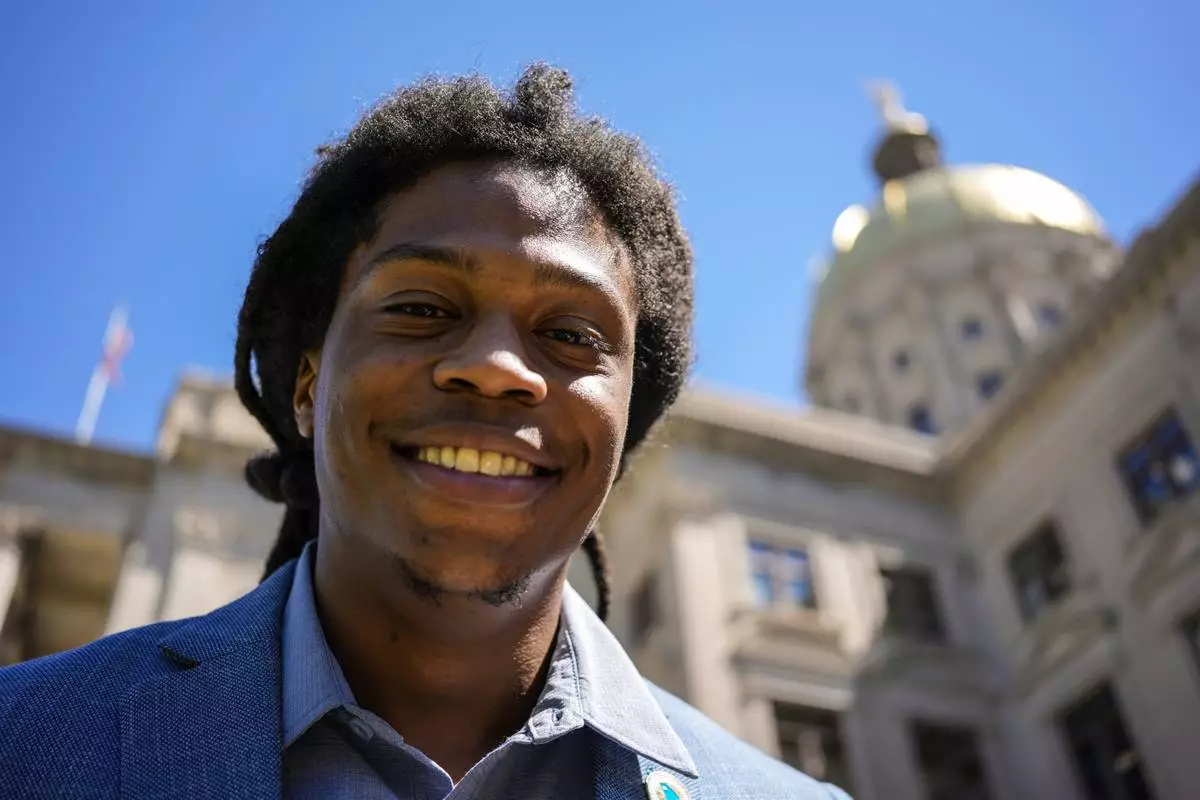
Davante Jennings poses for a photo at the state Capitol, Thursday, March 28, 2024, in Atlanta. Not long ago, Jennings was not even an active voter. He had given up on politics after the 2016 presidential election — his first time voting. But he was targeted by the New Georgia Project ahead of the 2022 elections and now helps reach out to would-be voters. (AP Photo/Mike Stewart)
TEL AVIV, Israel (AP) — U.S. Secretary of State Antony Blinken was meeting with Israeli leaders on Wednesday in his push for a cease-fire deal between Israel and Hamas, saying “the time is now” for an agreement that would free hostages and bring a pause in the nearly seven months of war in Gaza.
He said Hamas would bear the blame for any failure to get a deal off the ground.
Blinken is on his seventh visit to the region since the war erupted in October in his bid to secure what’s been an elusive deal between Israel and Hamas that could avert an Israeli incursion into the southern Gaza city of Rafah, where hundreds of thousands of Palestinians are sheltering.
The current round of talks appears to be serious, but the sides remain far apart on one key issue — whether the war should end as part of an emerging deal.
“We are determined to get a cease-fire that brings the hostages home and to get it now, and the only reason that that wouldn’t be achieved is because of Hamas,” Blinken told Israel’s ceremonial President Isaac Herzog at a meeting in Tel Aviv.
“There is a proposal on the table, and as we’ve said, no delays, no excuses. The time is now,” he said.
Blinken said the deal would also allow much needed food, medicine and water to get into Gaza, where the war has sparked a humanitarian crisis and displaced much of the territory's population.
After meeting with Herzog and also with families of Americans held by Hamas at his hotel, Blinken briefly greeted several dozen demonstrators calling for an immediate hostage release deal on the sidewalk outside.
Chanting “SOS, USA, only you can save the day" and “In Blinken we trust, bring them home to us,” the protestors urged him to make their case to Israeli Prime Minister Benjamin Netanyahu. Blinken will meet Netanyahu and his War Cabinet later Wednesday.
Blinken told the families that there was a very strong proposal on the table and that Hamas needs to say yes to it. “That is our determination, and we will not rest, we will not stop until you’re reunited with your loved ones,” he said.
His comments came on the last leg of his regional visit, with previous stops in Saudi Arabia and Jordan, where he urged Hamas to accept the latest proposal, calling it “extraordinarily generous” on Israel’s part.
According to the State Department, he will also visit an Israeli port where aid for Gaza is entering.
The United States has staunchly supported Israel's war since Hamas' unprecedented attack on Oct. 7 into southern Israel. But it has grown increasingly critical of the staggering toll borne by Palestinian civilians in Gaza and has been especially outspoken against Israel's plan to invade Rafah, Gaza’s southernmost city where some 1.5 million Palestinians have fled from fighting elsewhere in the territory, saying that any major offensive there would bring potential harm to civilians and should be avoided.
Netanyahu has repeatedly vowed to invade Rafah, which he says is Hamas’ last stronghold in the coastal strip, and on Tuesday he pledged to do so “with or without” a cease-fire deal.
The current deal that is being discussed — with brokering by the U.S., Egypt and Qatar — would see the release of dozens of hostages in exchange for a six-week halt in fighting as part of an initial phase, according to an Egyptian official and Israeli media. Hundreds of Palestinian prisoners held by Israel would also be released, including some serving long sentences.
But a sticking point remains over what happens next. Hamas has demanded assurances that an eventual release of all hostages will bring a complete end to Israel’s nearly seven-month assault in Gaza and a withdrawal of its troops from the devastated territory.
Israel has offered only an extended pause, vowing to resume its offensive once the first phase of the deal is over. The issue has repeatedly obstructed efforts by the mediators during months of talks.
While the talks appeared to be gaining steam, on Wednesday, an Egyptian official said that Hamas had asked Egyptian and Qatari mediators to provide clarity on the terms of the latest cease-fire proposal being discussed, a demand that could delay progress.
The official, who has close ties to the talks and who spoke on the condition of anonymity in order to freely discuss the deal, said Hamas wants clear terms for the unconditional return of displaced people to the north of Gaza and to ensure that the second stage of the deal will include discussing the gradual and complete withdrawal of all Israeli troops from the entire Gaza Strip.
The official said the current deal didn’t fully explain who would be allowed to return north and how it would be decided.
While talks are ongoing, the fighting in Gaza continues. Late Tuesday, an Israeli airstrike hit a house in central Rafah — a city Israel has struck repeatedly despite the masses that have taken refuge there — killing at least two children, according to hospital authorities. The bodies of the dead children were taken to the Abu Yousef al-Najjar hospital. An Associated Press journalist saw the bodies at the hospital morgue as their relatives mourned the deaths.
On Wednesday, Israel’s military said it was operating in central Gaza, where it said jets struck militants, including one said to be setting up explosives.
The Israel-Hamas war was sparked by the unprecedented Oct. 7 raid into southern Israel in which militants killed around 1,200 people, mostly civilians, and abducted around 250 hostages. Israel says the militants are still holding around 100 hostages and the remains of more than 30 others.
The war in Gaza has killed more than 34,000 Palestinians, according to local health officials. The war has driven around 80% of Gaza’s population of 2.3 million from their homes, caused vast destruction in several towns and cities and pushed northern Gaza to the brink of famine.
Associated Press writer Samy Magdy in Cairo contributed to this report.
Follow AP’s coverage of the war at https://apnews.com/hub/israel-hamas-war
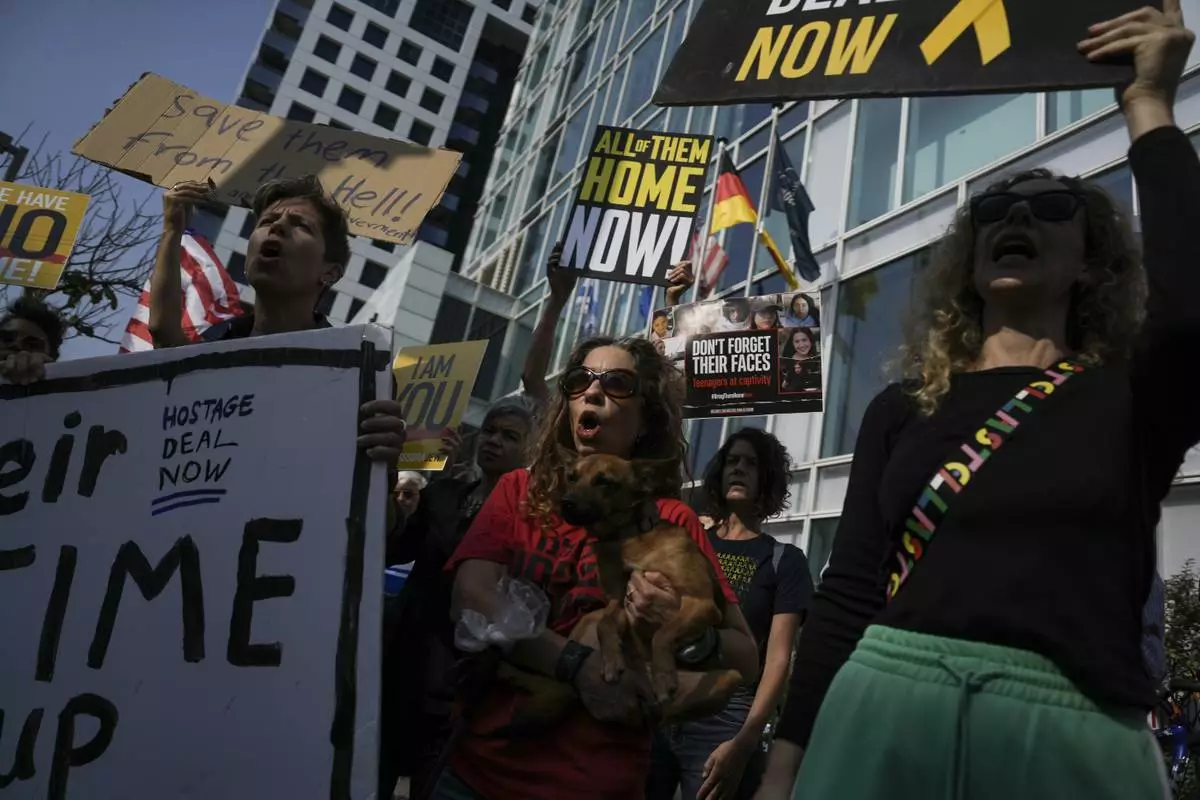
Families and supporters of Israeli hostages held by Hamas in Gaza hold banners and shut slogans during a protest calling for their return, outside a meeting between U.S. Secretary of State Antony Blinken and families of hostages in Tel Aviv, Wednesday, May 1, 2024. (AP Photo/Oded Balilty)
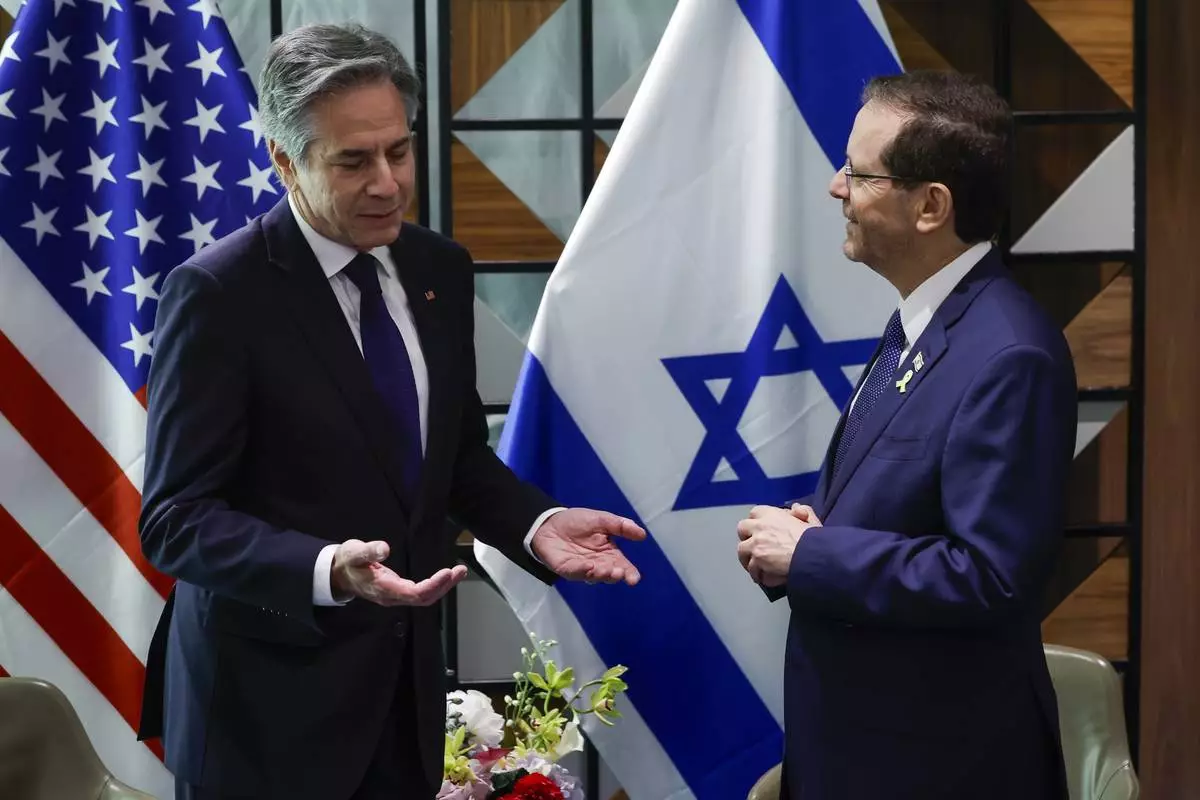
U.S. Secretary of State Antony Blinken, left, meets with Israeli President Isaac Herzog in Tel Aviv, Israel Wednesday, May 1, 2024. (Evelyn Hockstein/Pool Photo via AP)
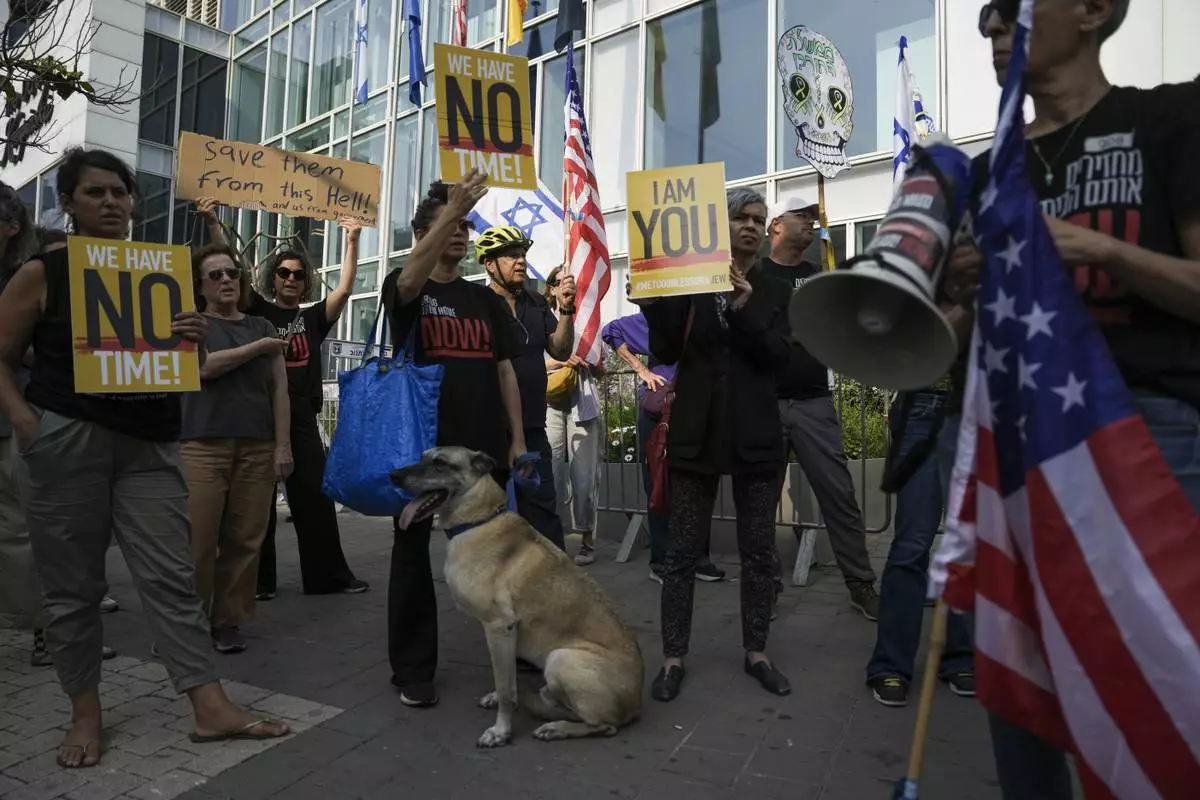
Families and supporters of Israeli hostages held by Hamas in Gaza hold banners and flags during a protest calling for their return, outside a meeting between U.S. Secretary of State Antony Blinken and families of hostages in Tel Aviv, Israel, Wednesday, May 1, 2024. (AP Photo/Oded Balilty)
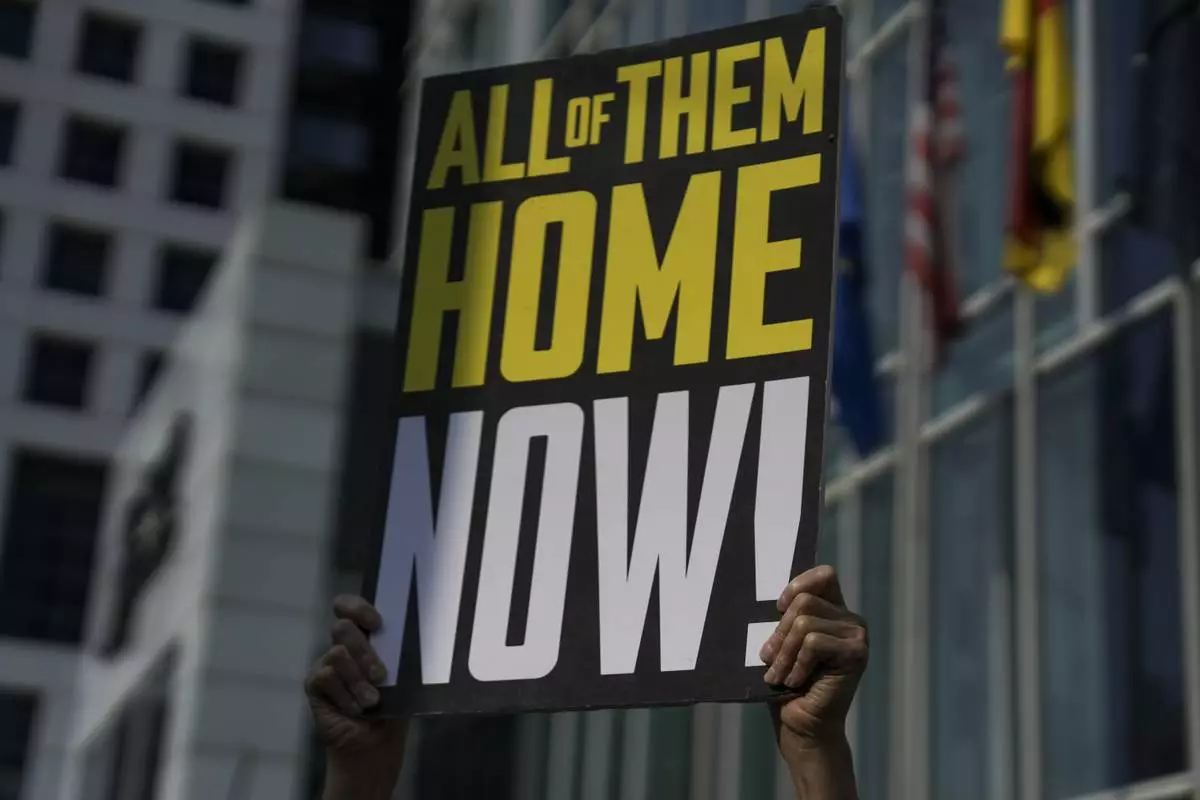
A woman holds a banner with families and supporters of Israeli hostages held by Hamas in Gaza during a protest calling for their return, outside a meeting between U.S. Secretary of State Antony Blinken and families of hostages in Tel Aviv, Israel, Wednesday, May 1, 2024. (AP Photo/Oded Balilty)
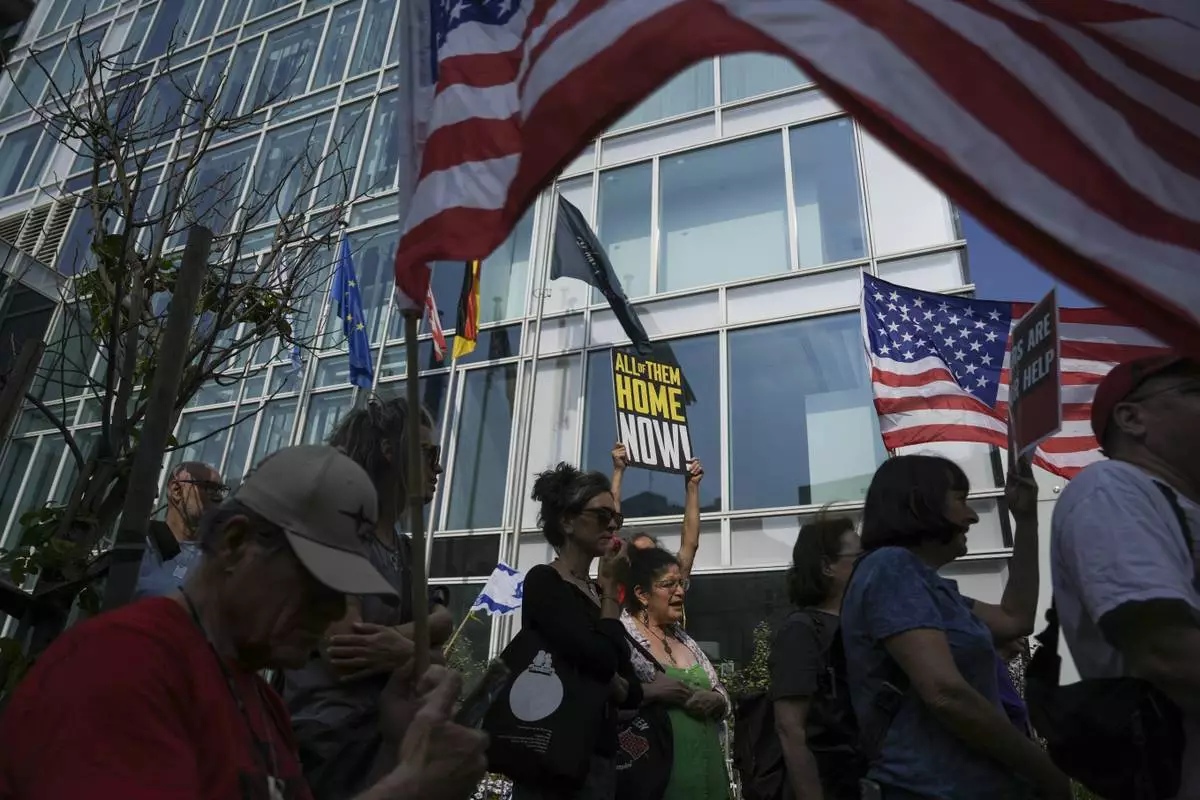
Families and supporters of Israeli hostages held by Hamas in Gaza hold banners and flags during a protest calling for their return, outside a meeting between U.S. Secretary of State Antony Blinken and families of hostages in Tel Aviv, Israel, Wednesday, May 1, 2024. (AP Photo/Oded Balilty)
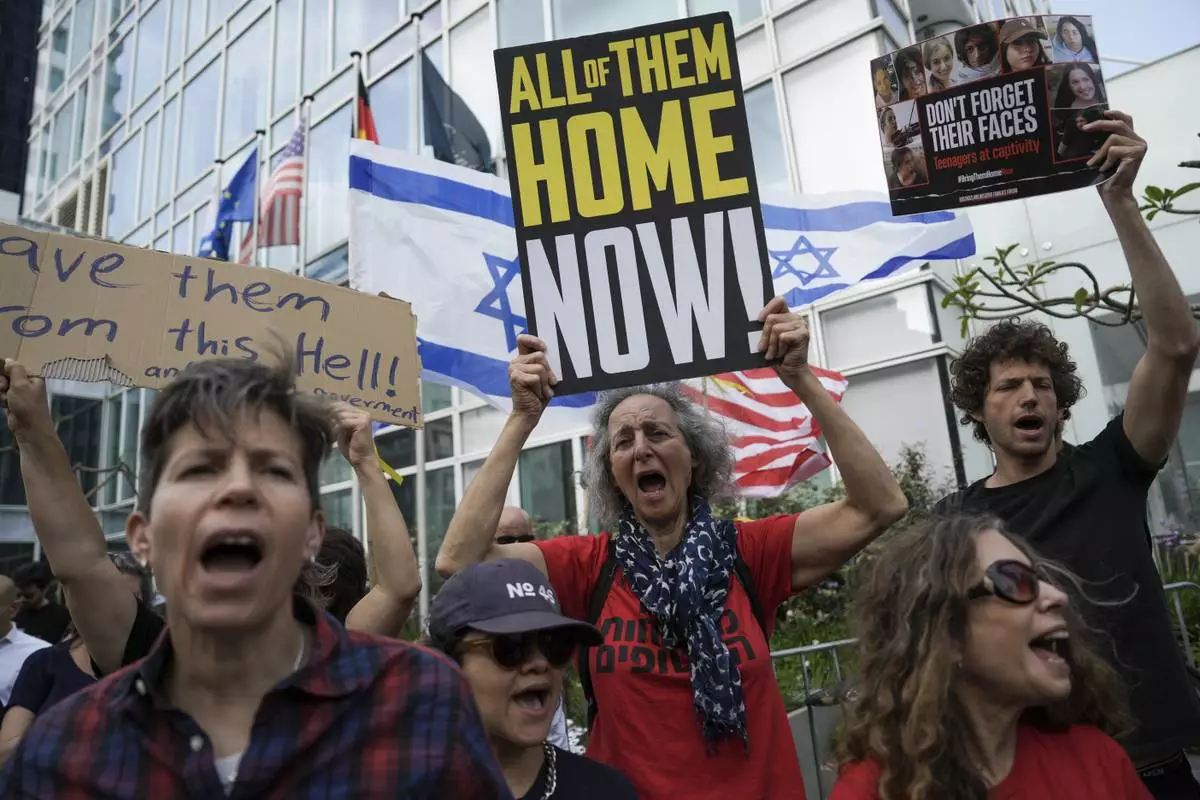
Families and supporters of Israeli hostages held by Hamas in Gaza hold banners and flags during a protest calling for their return, outside a meeting between U.S. Secretary of State Antony Blinken and families of hostages in Tel Aviv, Israel, Wednesday, May 1, 2024. (AP Photo/Oded Balilty)
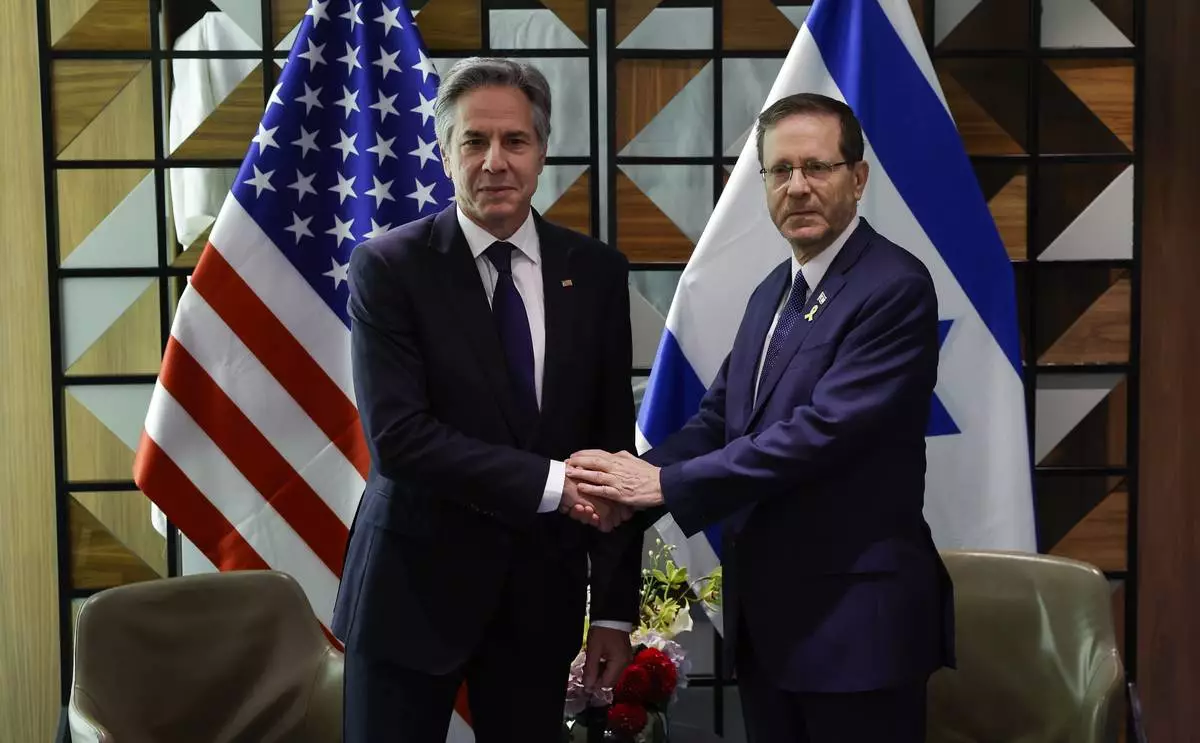
U.S. Secretary of State Antony Blinken, left, and Israeli President Isaac Herzog shake hands during their meeting in Tel Aviv, Israel Wednesday, May 1, 2024. (Evelyn Hockstein/Pool Photo via AP)
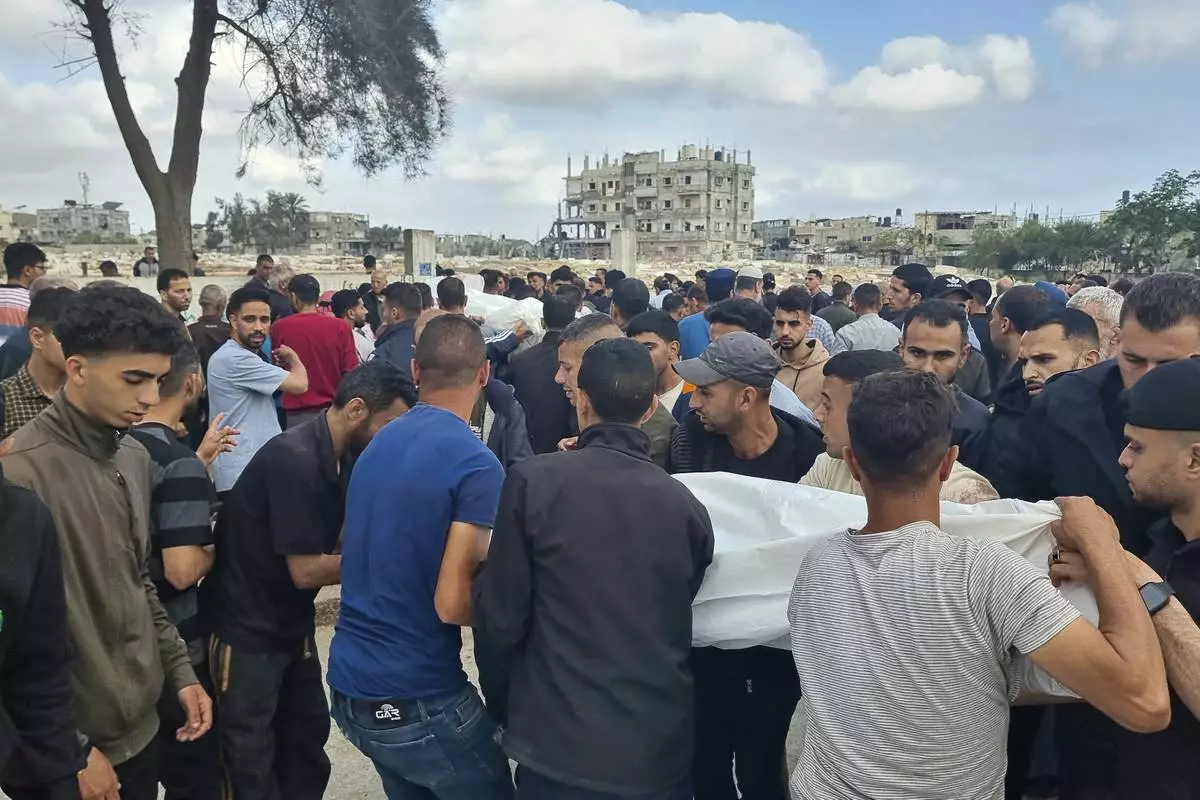
Mourners carry the bodies of members of the Abu Taha family who were killed in an Israeli airstrike, during their funeral at Al-Salam cemetery, east of Rafah, Gaza Strip. Monday, April 29, 2024. (AP Photo/Mohammad Jahjouh)
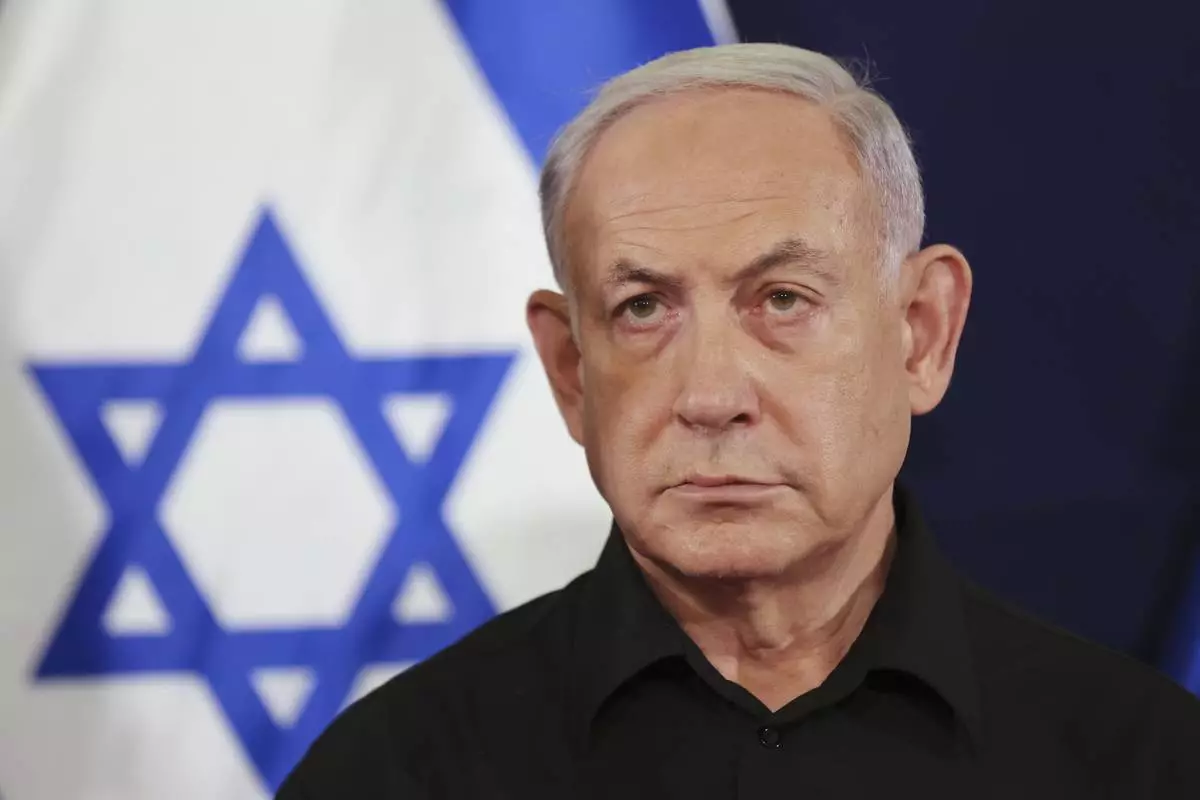
FILE - Israeli Prime Minister Benjamin Netanyahu attends a press conference in the Kirya military base in Tel Aviv, Israel on Oct. 28, 2023. Netanyahu pledged Tuesday, April 30 to launch an incursion into the southern Gaza city of Rafah, where hundreds of thousands of Palestinians are sheltering from the almost 7-month-long war, just as cease-fire negotiations between Israel and Hamas appear to be gaining steam. (Abir Sultan/Pool Photo via AP, File)
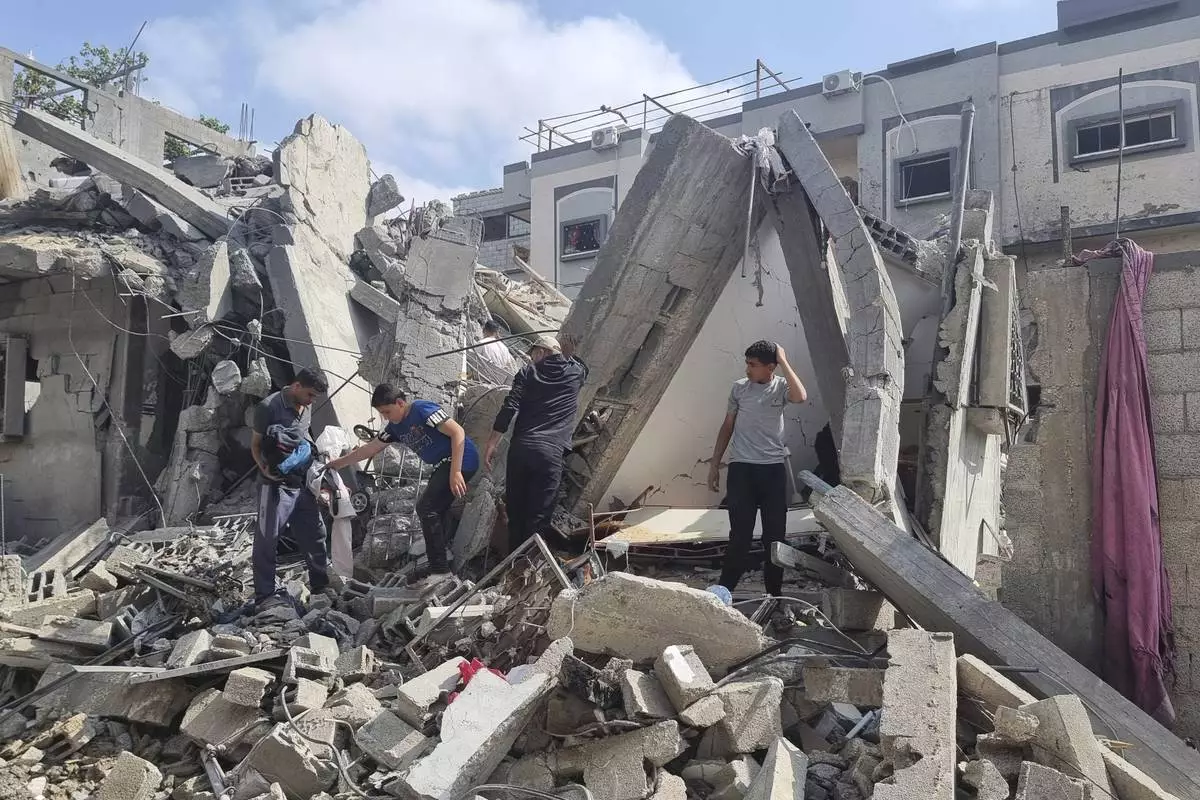
Palestinians look at the destruction after an Israeli airstrike in Rafah, Gaza Strip. Monday, April 29, 2024. (AP Photo/Mohammad Jahjouh)
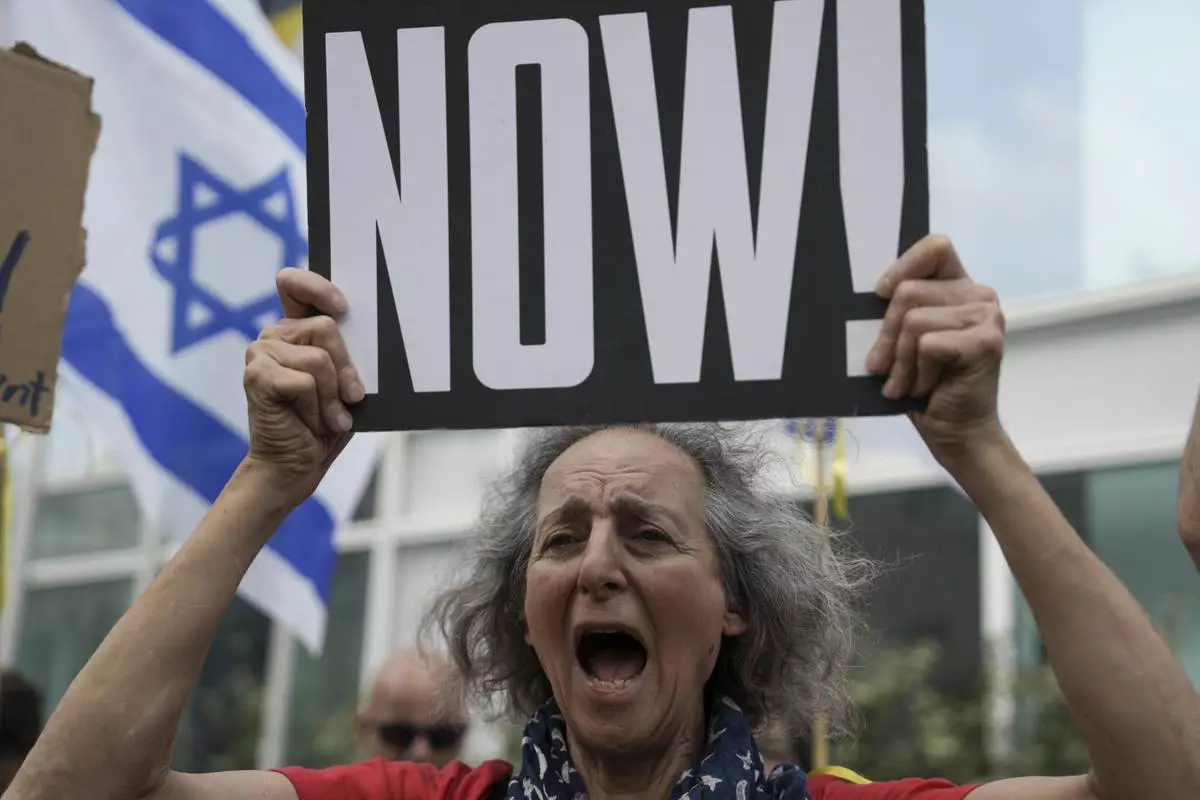
A woman holds a banner and shouts slogans with families and supporters of Israeli hostages held by Hamas in Gaza during a protest calling for their return, outside a meeting between U.S. Secretary of State Antony Blinken and families of hostages in Tel Aviv, Israel, Wednesday, May 1, 2024. (AP Photo/Oded Balilty)
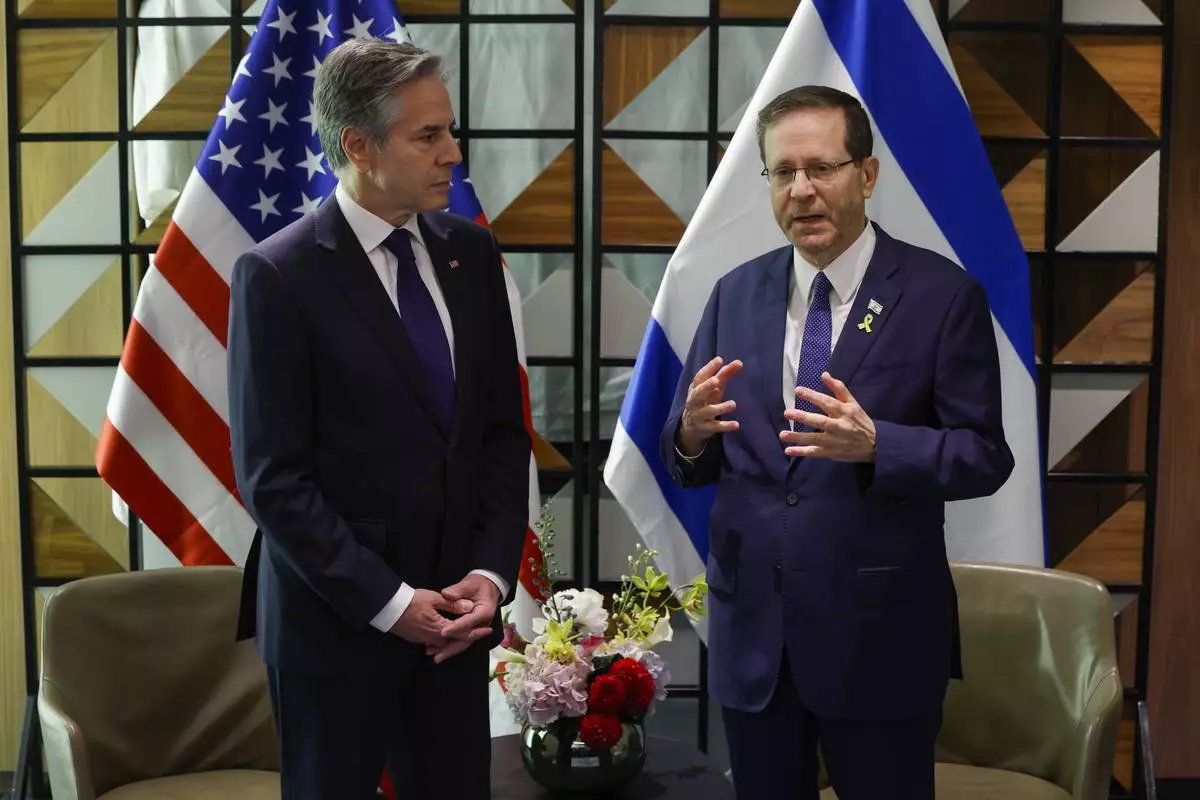
U.S. Secretary of State Antony Blinken, left, and Israeli President Isaac Herzog talk during their meeting in Tel Aviv, Israel, Wednesday, May 1, 2024. (Evelyn Hockstein/Pool Photo via AP)




